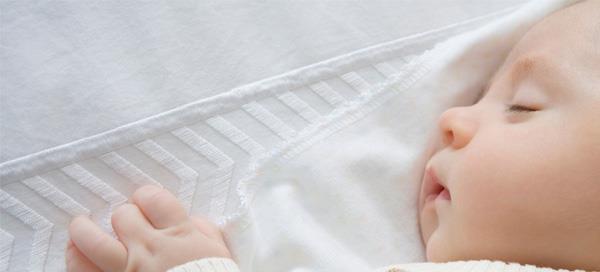Based on the infant's breathing rate, mothers will know a lot about the baby's health status. The tips of monitoring the baby's breathing will help mothers promptly recognize abnormal symptoms while caring for the baby.
content
Normal infant breathing rate
Know your baby's breathing irregularities
Mom can check the infant 's breathing whenever she feels the need. Usually, the baby's breathing is quite regular, but while the baby sleeps there are times when the mother feels like the baby is stopping breathing for a few seconds. Newborn babies usually breathe faster than adults and older babies.
Normal infant breathing rate
Newborn babies breathe a certain cycle, going from deep and rapid breaths and breaths to slow and shallow breathing. This cycle is called cyclic breathing. It is perfectly normal for your baby to stop breathing for a few seconds sometimes. Immediately after this stop, your baby will begin a new breathing cycle with deep breaths.
This kind of breathing will last for the first few months of your baby's life. If you want to make sure your baby's breathing is normal, you can take the following steps:
Listen: Mom brings her ear to baby's nose and mouth, and hears breathing. Is baby's breathing smooth and even? Is there a snort or a wheezing or hissing sound?
Observe: Look at the baby's chest to clearly see the rhythmic up and down movements when breathing. Occasionally, the mother will see the baby inhale the chest rise and fall a little hard, but don't worry because this is a normal phenomenon in newborn babies.
Feel: You can gently press your cheek against your baby's nose to feel your baby's breath.
The infant's breathing rate is perfectly normal when:
Babies from 0 to 6 months: Breathe from 30 to 60 times / minute.
Children from 6 to 12 months: Breathe from 24 to 30 times / minute.
Children from 1 to 5 years old: 20 to 30 times / minute.
Children from 5 to 12 years old: 12 to 20 times / minute.

The infant's breathing rate will follow a certain cycle and the mother will easily recognize this when observing and monitoring the baby.
Know your baby's breathing irregularities
With the following cases, mothers should carefully monitor the baby's breathing and take them to the hospital as soon as necessary:
Baby breathes over 60 times / minute
A strong , rapid breathing may be caused by being hot, stressed or fussy. Shortness of breath will stop after the mother removes her clothes and adjusts the room temperature to cool the baby, or after the baby stops crying.
If the phenomenon of fast breathing continues, the mother should check the baby's temperature to see if the baby has a fever. If the baby continues to breathe more than 60 times / minute, the mother should send the baby to the doctor.
Baby stopped breathing for more than 20 seconds
Pauses in infant breathing for a few seconds would be a safe limit. A baby's apnea for more than 20 seconds is a sign of a serious problem. Mom should follow these steps:
Have an ambulance caller
The mother let the baby lie on his back, slightly back, let the baby's mouth open a little.
Use the mother's mouth to place the baby's mouth and blow in the air, then leave the baby's mouth for about 1 second. Repeat the air blow 4 more times.
Breast pressure 30 times: Mom put 2 fingers in the center of baby's chest, press down 30 times.
Blow the baby 2 times.
Continue repeating 30 chest compressions and 2 breaths.
Continue until paramedics come to help or your baby is breathing again.
How to give first aid to common accidents in young children The surrounding environment always contains many dangers for babies regardless of age. Knowing some ways to first aid when a child has an accident is an essential knowledge for all parents. Below are tips for giving first aid to common accidents among young children.
Baby's nostrils swelled with each inhalation
Only when the baby has difficulty breathing like a stuffy nose , and the body does not get enough oxygen, the nostrils will swell out each time the baby breathes.
Chest concave and retracted
Another unusual sign of breathing when an infant is breathing is when the baby's ribs and mid-sternum are clearly indented with each inhalation.
Baby wheezing
When an infant is wheezing , hissing, or sneezing, he or she has a problem in the airway.
Cough and vomiting
Comes with problems such as shortness of breath, shortness of breath or shortness of breath, symptoms of coughing a lot and vomiting is also something mothers need to pay attention to. Your baby may be suffering from a respiratory infection or reflux leading to pneumonia.

Revealing the best formula for babies with coughs Coughing babies is the thing that makes parents extremely worried, standing still, especially persistent coughing spells accompanied by heavy wheezing. At this time, mothers need to find out clearly the cause to have effective treatment directions as well as effective care to help the baby quickly recover.
With the above know-how to "taste" the infant's breathing, mothers will be more proactive in monitoring their child's health. When there are any signs of an abnormality, the mother can take the baby to the nearest clinic, children's hospital for advice. Respiratory problems can get worse very quickly and complicate easily, so mothers need to stay calm to handle them properly and be alert when noticing abnormal symptoms. .














